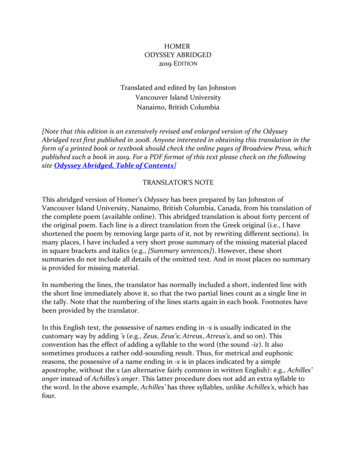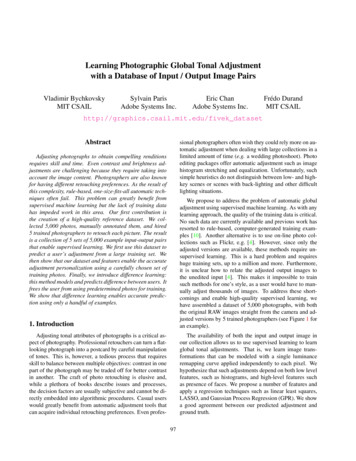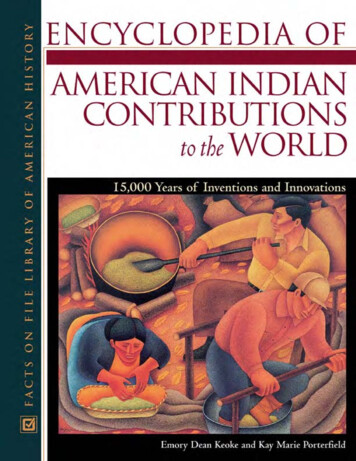
Transcription
HOMERODYSSEY ABRIDGED2019 EDITIONTranslated and edited by Ian JohnstonVancouver Island UniversityNanaimo, British Columbia[Note that this edition is an extensively revised and enlarged version of the OdysseyAbridged text first published in 2008. Anyone interested in obtaining this translation in theform of a printed book or textbook should check the online pages of Broadview Press, whichpublished such a book in 2019. For a PDF format of this text please check on the followingsite Odyssey Abridged, Table of Contents]TRANSLATOR’S NOTEThis abridged version of Homer’s Odyssey has been prepared by Ian Johnston ofVancouver Island University, Nanaimo, British Columbia, Canada, from his translation ofthe complete poem (available online). This abridged translation is about forty percent ofthe original poem. Each line is a direct translation from the Greek original (i.e., I haveshortened the poem by removing large parts of it, not by rewriting different sections). Inmany places, I have included a very short prose summary of the missing material placedin square brackets and italics (e.g., [Summary sentences]). However, these shortsummaries do not include all details of the omitted text. And in most places no summaryis provided for missing material.In numbering the lines, the translator has normally included a short, indented line withthe short line immediately above it, so that the two partial lines count as a single line inthe tally. Note that the numbering of the lines starts again in each book. Footnotes havebeen provided by the translator.In this English text, the possessive of names ending in -s is usually indicated in thecustomary way by adding ’s (e.g., Zeus, Zeus’s; Atreus, Atreus’s, and so on). Thisconvention has the effect of adding a syllable to the word (the sound -iz). It alsosometimes produces a rather odd-sounding result. Thus, for metrical and euphonicreasons, the possessive of a name ending in -s is in places indicated by a simpleapostrophe, without the s (an alternative fairly common in written English): e.g., Achilles’anger instead of Achilles’s anger. This latter procedure does not add an extra syllable tothe word. In the above example, Achilles’ has three syllables, unlike Achilles’s, which hasfour.
ABRIDGED ODYSSEYThere is a Glossary (with a guide to pronunciation of names) at the end of the translatedtext, together with a suggested floor plan of Odysseus’s palace.This text may be downloaded, printed, and shared by general readers, students,performing artists, and teachers without charge and without permission. They may alsoedit the text to suit their purposes. Commercial use of the text, however, is not permittedwithout the permission of Ian Johnston.TABLE OF CONTENTSBook One: Athena Visits IthacaBook Two: Telemachus Prepares for His VoyageBook Three: Telemachus Visits Nestor in Pylos [omitted]Book Four: The Suitors Plan to Kill TelemachusBook Five: Odysseus Leaves Calypso’s IslandBook Six: Odysseus and NausicaaBook Seven: Odysseus at the Court of Alcinous in PhaeaciaBook Eight: Odysseus is Entertained in PhaeaciaBook Nine: Ismarus, the Lotus Eaters, and the CyclopsBook Ten: Aeolus, the Laestrygonians, and CirceBook Eleven: Odysseus Meets the Shades of the DeadBook Twelve: The Sirens, Scylla and Charybdis, The Cattle of the SunBook Thirteen: Odysseus Leaves Phaeacia and Reaches IthacaBook Fourteen: Odysseus Meet EumaeusBook Fifteen: Telemachus Returns to IthacaBook Sixteen: Odysseus Reveals Himself to TelemachusBook Seventeen: Odysseus Goes to the Palace as a BeggarBook Eighteen: Odysseus and Irus the Beggar [omitted]Book Nineteen: Eurycleia Recognizes OdysseusBook Twenty: Odysseus Prepares for His RevengeBook Twenty-One: The Contest with Odysseus’s BowBook Twenty-Two: The Killing of the SuitorsBook Twenty-Three: Odysseus and PenelopeBook Twenty-Four: Zeus and Athena End the 32134142154160Possible Floor Plan of Odysseus’s HouseGlossaryA Note on the Translator1681691602
ABRIDGED ODYSSEYBOOK ONEATHENA VISITS ITHACAMuse, speak to me now of that resourceful manwho wandered far and wide after ravagingthe sacred citadel of Troy. He came to seemany people’s cities, where he learned their customs,while on the sea his spirit suffered many torments,as he fought to save his life and lead his comrades home.But though he wanted to, he could not rescue them—they all died from their own stupidity, the fools.They feasted on the cattle of Hyperion,god of the sun—and so he snatched away their chanceof getting home someday.1 So now, daughter of Zeus,tell us his story, starting anywhere you wish.2The other warriors, all those who had escapedbeing utterly destroyed, were now back safely home,facing no more dangers from battle or the sea.But Odysseus, who longed to get back to his wifeand reach his home, was being held in a hollow caveby that mighty nymph Calypso, noble goddess,who desired to have Odysseus as her husband.But as the seasons came and went, the year arrivedin which, according to what gods had once ordained,he was to get back to his home in Ithaca—not that he would be free from troubles even there,among his people. The gods pitied Odysseus,all except Poseidon, who kept up his angeragainst godlike Odysseus and did not relentuntil he reached his native land.31020But at that moment,Poseidon was among the Ethiopians,a long way off.4 The other gods had assembledHyperion: Also called Helios, Hyperion treasured his several herds of cattle; the incident with his cattle isrelated in detail in Book 12.1daughter of Zeus: The Muses, divine patrons of the arts, are daughters of Zeus, the most powerful god onOlympus.2Poseidon: God of the sea, divine brother of Zeus, often called “encircler of the earth” or “Earthshaker”(because he rules over earthquakes).3Ethiopians: To the ancient Greeks, the name Ethiopia did not necessarily denote the country of today, butwas rather used as a loose term for various peoples imagined as living at the ends of the earth.43
ABRIDGED ODYSSEYin the great hall of Olympian Zeus. Among them all,30the father of gods and men was the first to speak.In his heart he was recalling royal Aegisthus,whom Orestes, Agamemnon’s celebrated son,had slaughtered. With him in mind, Zeus now addressed them:“It’s disgraceful how humans blame the gods.They say their tribulations come from us,when they themselves, through their own foolishness,bring hardships which are not decreed by Fate.Now there’s Aegisthus, who took for himselfthe wife of Agamemnon, son of Atreus,and then butchered him, once the man came home.1That was not set by Fate. Aegisthus knewhis acts would bring about his total ruin.So he has paid for everything in full.”40Athena, goddess with gleaming eyes, answered Zeus:“Son of Cronos and father to us all,you who rule on high, yes indeed, Aegisthusnow lies dead, something he well deserved.2May any other man who does what he didalso be destroyed! But my heart is tornfor versatile Odysseus, ill-fated man,who has had to suffer such misfortunefor so many years, far away from friends.He’s on an island, surrounded by the sea,the one that forms the ocean’s navel stone.3And there, in the forests, lives a goddess,who stops the sad, unlucky man from leaving.Odysseus yearns to see even the smokerising from Ithaca and longs for death.Yet, despite that, Olympian Zeus, your heartdoes not respond to him. Did not Odysseusoffer you delightful sacrifices5060royal Aegisthus in full: Aegisthus, as part of a scheme to avenge a terrible act of Agamemnon’s fatheragainst his father, seduced Agamemnon’s wife, Clytaemnestra, while Agamemnon was leading the Achaeanarmy at Troy, and when Agamemnon returned victorious, the two lovers killed him and took control ofArgos. Orestes, Agamemnon’s son, who was away at the time of the murder, returned to Argos in disguiseand avenged his father by killing Aegisthus and Clytaemnestra. This famous story is referred to a number oftimes in the Odyssey. Agamemnon’s shade provides some details of the killing in Book 11.1Cronos: Leader of the Titans, he was overthrown by his son Zeus and imprisoned deep in the earth.2The Greek word omphalos (navel stone) Homer uses here to describe Calypso’s island of Ogygia.34
ABRIDGED ODYSSEYon Troy’s far-reaching plain beside the ships?If so, why are you so angry with him?”Cloud-gatherer Zeus then answered her and said:“My child,How could I forget godlike Odysseus,pre-eminent among all mortal menfor his intelligence and offeringsto the immortal gods who hold wide heaven?But Earthshaker Poseidon, a stubborn god,is still furious about that cyclops,the one whose eye Odysseus destroyed,godlike Polyphemus, the mightiestof all the Cyclopes.1 Thoosa bore him,the sea nymph, a daughter of that Phorcyswho commands the restless deep.2 Poseidon,down in those hollow caves, had sex with her.That’s the reason Earthshaker Poseidonmakes Odysseus wander from his country.But he has not killed him yet. So come now,let’s all of us consider his return,so he can journey back to Ithaca.Poseidon’s anger will relent. He can’tfight the immortal gods all by himself,not with all of us arrayed against him.”7080Athena, goddess with the gleaming eyes, replied:“Son of Cronos and father to us all,ruling heaven above, let’s send Hermes,killer of Argus, as our messenger,over to the island of Ogygia,so he can quickly tell that fair haired nymphour firm decision—that brave Odysseuswill now leave and complete his voyage home.3I’ll go to Ithaca and urge his son90Earthshaker Poseidon the Cyclopes: Poseidon’s son is Polyphemus, one of a race of giant, one-eyed, maneating monsters referred to as Cyclopes. This incident is further related in Book 9.1Phorcys: a primordial god of the sea.2Hermes: divine son of Zeus and messenger of the gods; he killed the monster Argus, whom Zeus’s wife andsister, Hera, had told to guard the young girl Io, in order to prevent her getting into sexual mischief withZeus; Ogygia: name of the island where Calypso lives and where she is detaining Odysseus.35
ABRIDGED ODYSSEYto action and put courage in his heart,so he will call those long-haired Achaeansto assembly and address the suitors,who keep on butchering his flocks of sheepand shambling bent-horned cattle.1 I’ll send himon a trip to Sparta and sandy Pylos,to learn about his father’s journey home—he may hear of it somewhere—and to gaina worthy reputation among men.”Athena spoke. Then she tied those lovely sandalson her feet, the immortal, golden sandalswhich carry her as fast as stormy blasts of windacross the ocean seas and endless tracts of land.Athena raced down from the peak of Mount Olympus,sped across to Ithaca, and then just stood there,at Odysseus’s outer gate before the palace,on the threshold, her hand still gripping a bronze spear,in the form of Mentes, a foreigner, the chiefwho ruled the Taphians.2 There she met the suitors,those arrogant men, who were enjoying themselvesplaying checkers right outside the door, sitting downon hides of cattle.100110Godlike Telemachusobserved Athena first, well before the others.He moved up near the goddess and then spoke to her—his words had wings:“Welcome to you, stranger.You must enjoy our hospitality.Then, after you have had some food to eat,you can tell us what you need.”120After saying this,Achaeans: Achaeans: Strictly speaking, the term Achaeans refers to the inhabitants of Achaea, a region ofthe Peloponnese in Greece. However, here and in the rest of Homer’s text the word designates residents ofGreece generally, in contrast to those who do not speak Greek (the barbarians). Homer does not use theterm Greeks or Hellenes, words which to modern readers might suggest a greater degree of political unitythan what, in fact, prevails. Occasionally, instead of the name Achaeans, Homer uses the word Argives(citizens of Argos) or Danaans (descendants of Danaus) as a general name for all the Greeks; the suitors bent-horned cattle: The suitors are the rich, young aristocratic men of Ithaca and the neighboring islandswho are seeking to marry Penelope, Odysseus’s wife, in the belief that Odysseus is dead.1Mentes: An old friend of Odysseus.26
ABRIDGED ODYSSEYTelemachus led Athena into his home.He brought the goddess in and sat her in a chair,a beautifully constructed work. Beneath ithe rolled out a linen mat and then set in placea footstool for her feet. Beside her he drew upa lovely decorated chair for him to sit in.A female servant carried in a fine gold jugand poured water out into a silver basin,130so they could wash their hands. Beside them she set downa polished table. Then the worthy housekeepercarried in the bread and put it down before them.She laid out a rich selection of fine things to eat,drawing freely on supplies she had in store.A carver sliced up many different cuts of meatand served them. Then he brought out goblets made of gold,as a herald went back and forth serving the wine.Then, one after another, the proud suitors came.They sat down on reclining seats and high-backed chairs.140Heralds poured water out for them to wash their hands,and women servants piled wicker baskets full of bread,while young lads filled their bowls up to the brim with drink.The suitors reached out with their hands to help themselvesto the fine food prepared and placed in front of them.When each and every man had satisfied his needfor food and drink, their hearts demanded something more—dancing and song—the finest joys of dinner feasts.A herald gave a splendid lyre to Phemius,so he was forced to sing in front of all the suitors.1On the strings he plucked the prelude to a lovely song.But then Telemachus, leaning his head over,close to Athena, so no one else could listen,murmured to her:“Dear stranger, my guest,These men here, they spend all their time like this,with songs and music—it’s easy for them,because they gorge themselves on what belongsto someone else, and with impunity—a man whose white bones may well be lyingon the mainland somewhere, rotting in the rain,1lyre: Stringed instrument resembling a small harp.7150160
ABRIDGED ODYSSEYor in the sea, being tossed around by waves.If they saw him return to Ithaca,they’d all be praying they had swifter feetrather than more wealth in gold or clothing.But by now some evil fate has killed him,and for us there is no consolation,not even if some earth-bound mortal manshould say that he will come. But tell me this,and speak candidly—Who are your people?What city do you come from?”Then Athena,goddess with the gleaming eyes, answered Telemachus:“To you I will indeed speak openly.I can tell you that my name is Mentes,a son of the wise Anchialus, and kingof Taphians, who love the oar.1 My shipis in a berth some distance from the town.But come, speak openly and tell me this—What is this feast? Who are these crowds of men?Why do you need this? Is it a wedding?Or a drinking party? It seems clear enoughthis is no meal where each man brings his share,and I can see that people here are actingin an insulting, overbearing way,while dining in your home.”170180Noble Telemachusthen said to Athena in reply:“Stranger,since you’ve questioned me about the matter,I’ll tell you. Our house was once well on its wayto being rich and famous—at that timeOdysseus was alive among his people.But now the gods with their malicious planshave changed all that completely. They make sureOdysseus stays where nobody can see him—gods have not dealt with other men this way.But it’s not him alone who makes me sadand cry out in distress. For now the gods1Taphians: Sea-faring people of the island of Taphos.8190
ABRIDGED ODYSSEYhave brought me more intolerable grief.All the best young men who rule the islands,Dulichium and wooded Zacynthus,and Same, as well as those who lord it herein rocky Ithaca—they are all nowwooing my mother and ravaging my house.1She won’t turn down a marriage she detestsbut can’t bring herself to make the final choice.Meanwhile, these men are feasting on my homeand soon will be the death of me as well.”200This made Pallas Athena angry—she said to him:“It’s bad Odysseus is still wanderingwhen you need him here so much! He could layhis hands on these disrespectful suitors!Listen now to what I’m going to tell you.Tomorrow you must summon the Achaeansto an assembly and address them all,appealing to the gods as witnesses.Tell the suitors to go back to their homes.As for your mother, if her heart is seton getting married, then let her returnto where her father lives, for he’s a manof great capabilities and power.He’ll organize the marriage and arrangethe wedding gifts, as many as befita well-loved daughter. Now, as for yourself,if you’ll listen, I have some wise advice.Set off in search of news about your father,who’s been gone so long. Some living mortalperhaps can tell you something, or you may heara voice from Zeus, which often brings men news.Sail first to Pylos—speak to noble Nestor.2After you’ve been there, proceed to Spartaand fair-haired Menelaus, the last oneof all bronze-clad Achaeans to get home.3You must not keep on acting like a child—the time has come when you’re too old for that.”1210220230Dulichium, and and Same: Islands near Ithaca, part of Odysseus’s kingdom.Nestor: King of Pylos, whose army had fought alongside other Achaeans during the Trojan War and whohad returned home safely afterwards.2Menelaus: King of Sparta and husband of Helen, whose abduction had ostensibly incited the Trojan War.39
ABRIDGED ODYSSEYPrudent Telemachus then answered her:“Stranger,you have been speaking to me as a friend,just like a father would for his own son—and what you’ve said I never will forget.But come now, though you’re eager to be off,stay here a while. Once you’ve enjoyed a bathand your fond heart is fully satisfied,go back with joyful spirits to your shipcarrying with you an expensive gift,something truly beautiful, which will bemy gift to you, an heirloom of the sortdear guest-friends give to those who are their friends.”1240Goddess Athena with the gleaming eyes then said:“Since I’m eager to depart, don’t keep mea moment longer. And whatever giftyour heart suggests you give me as a friend,present it to me when I come back here.Pick me out something truly beautifulIt will earn you something worthy in return.”This said, Athena with the gleaming eyes departed,flying off like some wild sea bird. In his heart she putcourage and strength. She made him recall his fathermore keenly than before. In his mind, Telemachuscould picture her—a sense of wonder filled his heart.In his mind she was a god. So he moved away.And then the noble youth mingled with the suitors.The famous minstrel Phemius was performing,as they sat in silence, listening. He was singingof the return of the Achaeans, that bitter tripAthena forced on them when they sailed home from Troy.2250260In her upstairs room, the daughter of Icarius,guest friend: guest friendship is an important and complex set of rituals governing hospitality towardsstrangers visiting one’s own home; the notion places great emphasis on a courteous welcome, food,entertainment, and an appropriate exchange of gifts.1Athena, though a supporter of the Achaeans during the war, was outraged at the way their army behavedduring the sack of Troy, especially at their savage treatment of Troy’s holy places. So she punished the armyby making the voyage home very difficult or even fatal for some of its leaders.210
ABRIDGED ODYSSEYwise Penelope, heard the man’s inspired song.She came down the towering staircase from her room,but not alone—two female servants followed her.When beautiful Penelope reached the suitors,she stayed beside the doorpost in the well-built room,a small bright veil across her face. On either sideher two attendants waited. With tears streaming down,Penelope addressed the singer:“Phemius,you know all sorts of other ways to charman audience, actions of gods and menwhich singers celebrate. As you sit here,sing one of those, while these men drink their winein silence. Don’t keep up that painful song,which always breaks the heart here in my chest,for, more than anyone, I am weighed downwith ceaseless grief which I cannot forget.I remember, always with such yearning,my husband’s face, a man whose fame has spreadfar and wide through Greece and central Argos.”270280Sensible Telemachus answered her and said:“Mother, why begrudge the faithful singerdelighting us in any way his mindmay prompt him to? One can’t blame the singers.It seems to me it’s Zeus’s fault. He handsto toiling men, to each and every one,whatever he desires. There’s nothing wrongwith this man’s singing of the evil fateof the Danaans, for men praise the mostthe song which they have heard most recently.1Your heart and spirit should accept his song.Go up to your rooms and keep busy therewith your own work, the spindle and the loom.Tell your servants to perform their duties.Talking is men’s concern, yes, every man’s,but especially mine, since in this houseI’m the one in charge.”Astonished at his speech,1Danaans: Another name for the Greeks.11290
ABRIDGED ODYSSEYPenelope went back up to her own chambers,keeping her son’s prudent words lodged in her heart.With her attendant women she climbed up the stairs,went to her rooms, and there wept for Odysseus,her dear husband, until gleaming-eyed Athenacast sleep upon her eyelids.300In the shadowy hallsthe suitors then started to create an uproar,each man shouting out his hope to lie beside her.So shrewd Telemachus began to talk to them:“You suitors of my mother, who displaysuch shameless arrogance, let us for nowenjoy our banquet, but no more shouting,for it’s grand to listen to a singeras fine as this—his voice is like a god’s.But in the morning let us all assemble,sit down for a meeting, so I can speakand tell you firmly to depart my home.Prepare your feasts elsewhere, ones that eat upyour own possessions, moving house to house.If you think it’s better and would preferthat one man’s livelihood should be consumedwithout paying anything, I’ll call onthe immortal gods to see if mighty Zeuswill bring about an act of retribution.And if you are destroyed inside my home,you will not be avenged.”310320Telemachus finished.They all bit their lips, astonished he had spoken outso boldly. Then, Antinous, son of Eupeithes,answered him:“Telemachus, the gods themselves,it seems, are teaching you to be a braggartand give rash speeches. I do hope that Zeus,the son of Cronos, does not make you kingof this island Ithaca, even thoughit is your father’s legacy to you.”The suitorsthen switched to dancing and to singing lovely songs.12330
ABRIDGED ODYSSEYThey entertained themselves until dark evening fell.Then each of them retired to his own house to sleep.Telemachus moved up to where his room was builthigh in the splendid courtyard, with a spacious view,his mind much preoccupied on his way to bed.Accompanying him, quick-minded Eurycleiaheld two flaming torches. She was Ops’s daughter.Of all the female household slaves she was the onewho loved him most, for she had nursed him as a child.He opened the doors of the well-constructed room,sat down on the bed, and pulled off his soft tunic,gave it to the wise old woman, who smoothed it out,and folded it, then hung the tunic on a pegbeside the corded bedstead. Then she left the room,closing the door by pulling its silver handle.Telemachus lay there all night long, warmly wrappedwith sheep’s wool, his mind reflecting on the journeywhich Athena had earlier proposed to him.340350BOOK TWOTELEMACHUS PREPARES FOR HIS VOYAGEAs soon as rose-fingered early Dawn appeared,Odysseus’ dear son jumped out of bed and dressed.He laced up lovely sandals on his shining feetand carried a sharp sword hanging from his shoulders.At once he asked the loud-voiced heralds to summonall the long-haired Achaeans to an assembly.They issued the call, and the Achaeans answered,gathering quickly. When the assembly had convened,Telemachus joined the meeting. Among the men,heroic Aegyptius was the first to speak,an old man stooped with age.“You men of Ithaca,pay attention to what I have to say.We have not held a general meetingor assembly since the day Odysseussailed from here in his hollow ships. What manhas made us gather now? What’s his reason?Has he heard some news about the army1310
ABRIDGED ODYSSEYand will give us details of its journey home,or is it some other public businesshe will bring up and talk to us about?”20Odysseus’s dear son Telemachus then spoke,talking to Aegyptius first of all:“Old man,the one who called the people to this meetingis not far off, as you will quickly learn.I did. For I’m a man who suffers morethan other men. But I have no reportsof our returning army, no detailsI’ve just heard myself to pass on to you,nor is there any other public businessI will mention or discuss. The issue nowis my own need, for on my household heretroubles have fallen in a double sense.First, my noble father’s perished, the manwho was once your king and my kind father.And then there’s an even greater problem,which will quickly and completely shatterthis entire house, and my whole livelihoodwill be destroyed. These suitors, the dear sonsof those men here with most nobility,are pestering my mother against her will.They don’t want to journey to her father,Icarius, in his home, where he himselfcould arrange a bride price for his daughterand give her to the man he feels he likes,the one who pleases him the most. Instead,they hang around our house, day after day,slaughtering oxen, well fed goats, and sheep.They keep on feasting, drinking gleaming winewithout restraint, and they consume so much.My home is being demolished in a waythat is not right. You men should be ashamed.”Telemachus spoke, then threw the sceptre on the groundand burst out crying. Everyone there pitied him,so all the other men kept silent, unwillingto give an angry answer to Telemachus.Antinous was the only one to speak. He said:14304050
ABRIDGED ODYSSEY“Telemachus you boaster, your spiritis too unrestrained. How you carry on,trying to shame us, since you so desirethe blame should rest on us. But in your case,Achaean suitors aren’t the guilty ones.Your own dear mother is, who understandshow to use deceit. It’s been three years now—and soon it will be four—since she beganto deceive the hearts in our Achaean chests.She gives hope to each of us, makes promisesto everyone, and sends out messages.But her intent is different. In her mindshe has thought up another stratagem.She had a large loom set up in her roomsand started weaving something very big,with thread that was quite thin. She said to us:‘Young men, those of you who are my suitors,since Odysseus is now dead, you must wait,although you are all keen for me to marry,till I complete this cloak—for if I don’t,my weaving would be wasted and in vain.It is a shroud for warrior Laertes,for the day a lethal Fate will strike him.1Then none of the Achaean women herewill be annoyed with me because a manwho acquired so many rich possessionswould lie without a shroud.’That’s what she said.And our proud hearts agreed. And so each dayshe wove at her great loom, but every nightshe set up torches and pulled the work apart.Three years she fooled Achaeans with this trick.They trusted her. But as the seasons passed,the fourth year came. Then one of her womenwho knew all the details spoke about them,and we caught her undoing her lovely work.So then we forced her to complete the shroudagainst her will. The suitors now say this,60708090Laertes: Odysseus’s aging father, who lives alone on his farm grieving his son’s presumed death; lethal Fate:The life of a mortal was often depicted as a thread, woven by the three Fates: Clotho, Lachesis, and Atropos.Atropos was responsible for cutting the thread, thus determining the length and end of one’s life.115
ABRIDGED ODYSSEYso you, deep in your heart, will understandand all Achaeans know—send your mother back.Tell her she must marry whichever manher father tells her and who pleases her.But we are not returning to our lands,or someplace else, not until she marriesan Achaean man of her own choosing.”100Prudent Telemachus then said in reply:“Antinous, there’s no way I will dismissout of this house against her will the onewho bore and nursed me. As for my father,he’s in a distant land, alive or dead.It would be hard for me to compensateIcarius with a suitable amount,as I would have to do, if I sent her back.If I did not pay him, then her fatherwould treat me badly, and some deitywould send other troubles, since my mother,as she went from this house, would call uponthe dreaded Furies.1 Men would blame me, too.That’s why I’ll never issue such an order.Just give me a swift ship and twenty men,so I can make a journey and returnto various places, to sandy Pylos,then to Sparta, to see if I can findsome news about my father’s voyage home.If I hear my father is still livingand returning home, I could hold out herefor one more year, although it’s hard for me.If I learn he’s dead and gone, I’ll come backto my dear native land, build him a tomb,and there perform as many funeral ritesas are appropriate. And after that,I will agree—she must choose a husband.”Telemachus said this and soon dissolved the meeting.The men dispersed, each one going to his own house.Telemachus walked away, along the ocean shore.There, once he had washed his hands in gray salt water,110120130Furies: Three vengeful goddesses of Greek mythology who pursue and punish those who break natural lawsor commit unavenged crimes, especially those within the family.116
ABRIDGED ODYSSEYto Athena he addressed this prayer:“O hear me,you who yesterday visited my homeas a god and ordered me to set offin a swift ship across the murky seas,to learn about my father’s voyage backafter being away so long. All thisAchaeans are preventing, most of all,the suitors with their evil arrogance.”As he said this prayer, Athena appeared to him,looking and soundin
ABRIDGEDODYSSEY 5 onTroy'sfar-reachingplainbesidetheships? Ifso,whyareyousoangrywithhim?" Cloud-gathererZeusthenansweredherandsaid: "Mychild .










